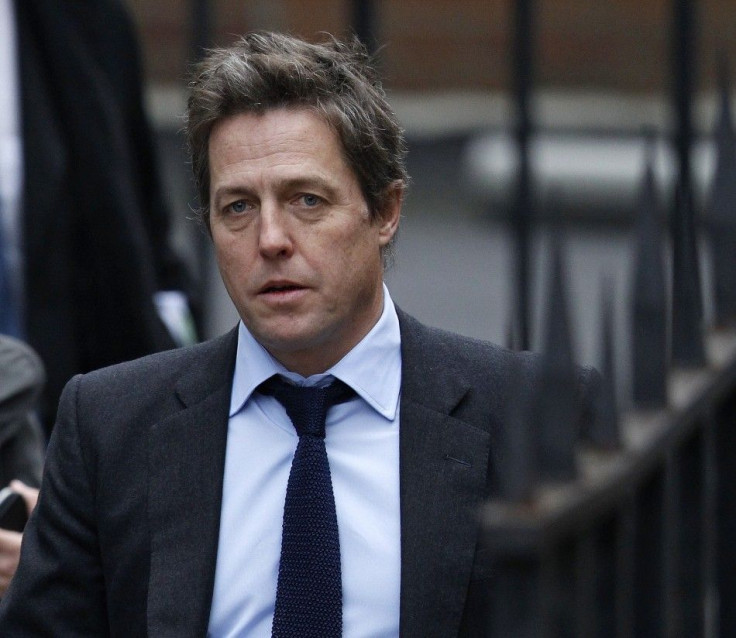Hugh Grant Blasts 'Privacy Invasion Industry' at Leveson Inquiry

Hugh Grant gave testimony Monday at the start of week two of the Lord Justice Leveson Inquiry into media ethics and journalism practices, which was organized in response to evidence that Rupert Murdoch-owned tabloids had hacked into the phones of celebrities and civilians alike, including 13-year old kidnapping victim Milly Dowler.
Grant has long been active in initiatives to end what he calls the culture of privacy intrusion among tabloid reporters. He was the face of the Hacked Off campaign to fight phone hacking this summer, and is a well-known advocate for regulation of media tactics. While Grant believes he has been a target off invasive tabloid journalism practices since his career first took off over two decades ago, the recent birth of his daughter has set off a new media frenzy which Grant described in detail in his testimony.
Grant complained that paparazzi have been relentlessly hounding Tinglan Hong, the mother of his infant daughter, and criticized the aggressive journalists for making it difficult to spend time with his daughter and in turn painting him as an absentee father.
Grant was widely criticized for not attending the birth of his daughter, and for only visiting her for about half an hour after her mother brought her home.
The 51-year-old actor expressed resentment toward criticism of his paternal role when he says he has been trying to protect his former lover and their daughter by staying out of the picture.
If I had been a really good father I wouldn't have visited at all, Grant argued, seeing that it brought down a press storm on the mother's head.
Grant also went after the tabloids for printing stories that insinuate he is dating 21-year old German bullesque dancer Elisa Schmidt, who he insists is only a friend.
This is now a fact that I have a new 21-year old German girlfriend all around the world, Grant said in explanation of how quickly inaccurate newspaper reports make their way around the Internet. One of the reasons they haven't been able to find pictures of me and my new German girlfriend is because I haven't got one.
Grant subsequently concurred that the reports of his alleged romance were not necessarily libelous, maintaining that he raised that particular story as an example of lazy reporting used to beat someone up.
If the girl had been twelve, he continued, I would have sued.
During his testimony, Grant accused the Daily Mail of paying Tinglan Hong's ex-boyfriend £125,000 for private photos of his former flame.
Grant also indicated regret for the way his initial statement acknowledging his daughter -- which described his time with Hong as a fleeting affair -- was received. According to the Washington Post, Grant explained that the statement was composed with his publicist over the phone while he was shooting a film in Germany.
It was not ideal circumstances, Grant reportedly told the inquiry. I was dressed as a cannibal at the time.
At another point, Grant defended his relationship with Hong.
She was a good friend of mine, he said. She still is a good friend.
Grant repeatedly referred to the tabloid press as a privacy invasion industry, and claimed that a tabloid independent of Murdoch's News Corp. had victimized him.
According to the Washington Post, Grant told the inquiry that he believed Mail on Sunday, which is owned by Associated Newspapers Ltd., had hacked into his voicemail in 2007, while he was dating Jemima Kahn. Mail on Sunday reported that his relationship with Kahn was on the rocks, citing 'conversations' he'd had with a plummy voiced woman.
Grant acknowledged that he did have voicemail messages from a woman in his professional circle (but who was not a romantic interest). She would leave charming, joking messages ... and she had a voice that can only be described as plummy, he told the inquiry, according to the Washington Post.
I'd love to hear what the Daily Mail or the Sunday Mail's explanation of what that source was if it wasn't phone hacking, he added.
Towards the end of his testimony, Grant accused the tabloid press of living in a funny cocoon of self-importance, and suggested that a panel of ethics be created to impose meaningful sanctions if certain codes of conduct were violated. He added that he was keen to see good journalism protected.
Grant read his closing remarks from his written witness statement:
'I don't want to see the end of popular print journalism. I wouldn't want a country that was fawning to power or success. I like and admire and always want to protect the British instinct to be irreverent, difficult, and to take the piss...The free press is of course the cornerstone of democracy. There's no question about that, he said.
I just think that there is a section of our press has been allowed to become toxic over the last twenty or thirty years, its main tactic being bullying and intimidation and blackmail And I think that needs a lot of courage to stand up to, Grant continued.
This country has had a historically good record of standing up to bullies and I think it's time this country has found the courage to stand up to this bully now.
© Copyright IBTimes 2025. All rights reserved.






















